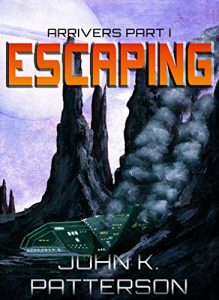5 stars ⭐⭐⭐⭐⭐
The battlecraft Aphrodite is on the run across the deserts of the planet Tarcryss, pursued by a mysterious alien force. With much of its weaponry destroyed by the invaders, Sergeant Tobias Carter must defend the ship’s rear with nothing more than a rifle. Can he fend off the attackers bent on destroying the ship’s three hundred human refugees? Does he himself still have the will to survive – and believe?
Escaping is the first in a series of short stories (Arrivers) with a space opera setting. It presumably takes place far into the future, where the human race has spread from Earth to colonize many different planets. These worlds are now threatened by a previously unknown alien race that has launched a sort of genocidal blitzkrieg campaign across the galaxy. The story introduces us to this world – and its central conflict – by placing the reader directly into the action. The descriptions are detailed, but economical, revealing a few essential background facts while still leaving many tantalizing questions. Who are the “Arrivers?” What is their purpose? Where did they come from? Why are they seemingly bent on the destruction of the human race?
Who are the “arrivers?”
The story’s Christian theme becomes immediately apparent in the opening paragraph. The protagonist, Tobias Carter, is a cynical, hardened soldier whose haunted past that has led him to abandon all belief in a higher power. The essential “problem” of this particular story comes down to his anger at God and how it’s holding him back. The reasons behind this anger are common ones regarding how a loving Creator can still allow pain and suffering to continue. The story’s approach to this question largely mirrors that of Dostoevsky in The Brothers Karamazov. It’s possible to answer it from a strictly intellectual standpoint, but doing so is to take the question on its own terms, which may be the wrong approach entirely. Human beings are not strictly intellectual creatures nor do we live in a strictly intellectual universe. Without giving too much away, the protagonist in Escaping is convinced not by logical reasoning, but through a powerful personal experience that shakes his view of reality.
All in all, I would describe this story as straightforward military science fiction with an underlying spiritual theme. The narrative is taut, direct, fast, and action-driven, but it does a good job of establishing characterization within a short length. It’s an extremely quick read that will seem somewhat incomplete as a standalone story, but the rest is obviously continued in a serial format. Its subsequent volumes are all available now, and I look forward to reading them. I would highly recommend it to anyone looking for an enjoyable read that creates no inconvenient demands on their time.
Content Ratings:
Heat: None.
Profanity: Two minor instances.
Violence: No blood or gore, but shooting and explosions within a military context.
Genre: Science Fiction/Space Opera short story
Age recommendation: 13 and up due to minor profanity.
Availability: This book is available on Amazon.
Reviewed by A.K. Preston
A.K. Preston is the author of The Gevaudan Project, and has published short stories in The Unseen Anthology and The Untold Podcast (to be released sometime this year). You can find him at his website, AKPreston.com. In his spare time, he likes to read classic literature, history, and speculative fiction of all types.



 By Divine Right: A Novella – The Darkwater Saga – Patrick W. Carr
By Divine Right: A Novella – The Darkwater Saga – Patrick W. Carr
Leave a Reply